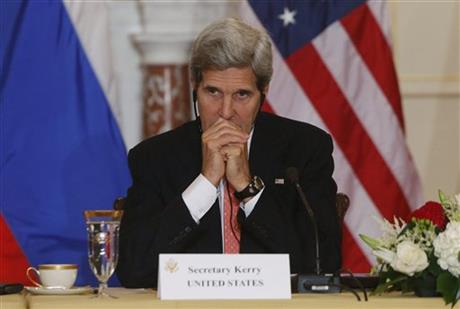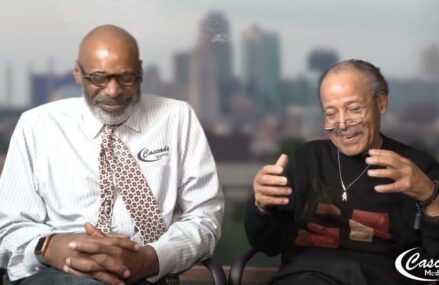
By DEB RIECHMANN
In this photo taken Aug. 9, 2013, Secretary of State John Kerry listens to translation as he meets with Russian Foreign and Defense ministers at the State Department in Washington, a sit-down tainted by the case of American National Security Agency leaker Edward Snowden, currently in Russia. This week on Kerry’s first visit to South America as the Obama administration’s chief diplomat, the disclosures by Snowden could chill talks on trade and energy, and even discussions about the Oct. 23 state dinner that President Barack Obama is hosting for Brazil’s president, Dilma Rousseff. (AP Photo/Charles Dharapak)
WASHINGTON (AP) — Secretary of State John Kerry’s trip to Colombia and Brazil this week builds on efforts to deepen relations with Latin America, but he can expect a curt reception from the two U.S. allies after reports that an American spy program widely targeted data in emails and telephone calls across the region.
On Kerry’s first visit to South America as the Obama administration’s chief diplomat, the disclosures by National Security Agency leaker Edward Snowden could chill talks on trade and energy, and even discussions about the Oct. 23 state dinner that President Barack Obama is hosting for Brazil’s president, Dilma Rousseff.
“I don’t think this is going to be a warm ‘abrazo,'” said Michael Shifter, president of the Washington-based Inter-American Dialogue, using the Spanish word for “hug.” ”I think it will be businesslike.”
Kerry was scheduled to arrive early Monday in Bogota, the Colombian capital. The country is holding peace talks to end a half century-old conflict with the Western Hemisphere’s most potent rebel army, a rebel force diminished in strength thanks in considerable measure to U.S. military and intelligence support.
The U.S. wants to show its support for the peace talks between the Colombian government and the Revolutionary Armed Forces of Colombia, or FARC, which are taking place in Cuba.
Colombia is one of the United States’ closest allies in the region, but the reports about the spying program have rankled Colombian officials.
Brazil’s O Globo newspaper reported last month that citizens of Colombia, Mexico, Brazil and other countries were among the targets of a massive NSA operation to secretly gather information about phone calls and Internet communications worldwide. The reports were based on information provided by Snowden.
Colombia’s president, Juan Manuel Santos, said Thursday that he wanted clarification from Washington on whether U.S. intelligence-gathering in Colombia had overstepped the countries’ joint operations against drug traffickers and illegal armed groups. The U.S. has supplied Colombia with eavesdropping equipment, technicians and aerial surveillance.
Santos said in an interview with The Associated Press that Vice President Joe Biden called him about the issue following revelations by Snowden that U.S digital snooping has targeted allies as well as foes. Santos said Biden offered a series of technical explanations. Asked if he was satisfied with them, Santos replied, “We are in that process.”
Biden also called Rousseff to express what Brazil’s communications minister, Helena Chagas, said was “his regret over the negative repercussions caused by the disclosures.” Biden invited Brazilian officials to Washington to get details about the spy program.
Rousseff told Biden that the privacy of Brazilian citizens and the country’s sovereignty cannot be infringed upon in the name of security, and that Brazil wanted the U.S. to change its security policies and practices.
Last week, Brazil’s Foreign Minister Antonio Patriota was at the United Nations with counterparts from other South American nations to express their indignation about the spy program to U.N. Secretary-General Ban Ki-moon.
The Obama administration has worked to forge stronger ties with Latin America. In May, Obama took a three-day trip to Mexico and Costa Rica. Biden has visited Colombia and Brazil, where he said stronger trade ties and closer cooperation in education, science and other fields should usher in a new era of U.S.-Brazil relations this year.
Brazil has received much attention in recent months because of Pope Francis’ visit and preparations for the 2014 World Cup and the 2016 Olympics to be held in Rio de Janeiro.
Thousands of demonstrators have staged anti-government protests since June demanding better public services in return for high taxes they pay. Under considerable domestic pressure, Rousseff announced a $4 billion program to improve transportation, sewage and public housing in Sao Paulo, Brazil’s largest city.
The protests have weakened her domestic support, but she can bolster her poll numbers with a strong stand against the U.S. over the spying allegations, said Carl Meacham, former Latin America adviser on the Senate Foreign Relations Committee and director of the Americas Program at the Center for Strategic and International Studies in Washington.
“I think the tone of the visit will be a bit tense because of these issues raised by the surveillance (program) and I think Secretary Kerry will have to speak to that,” he said.



